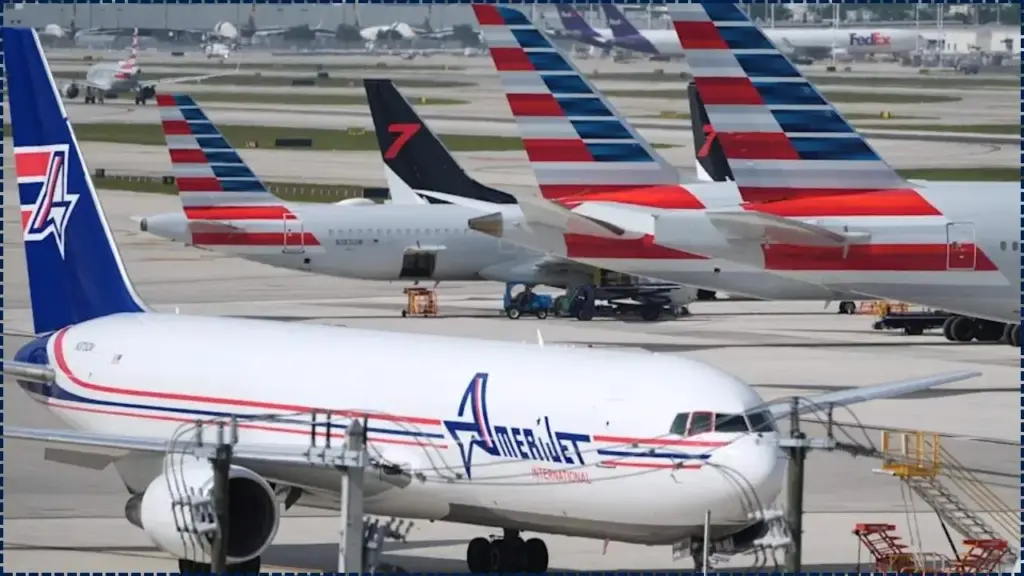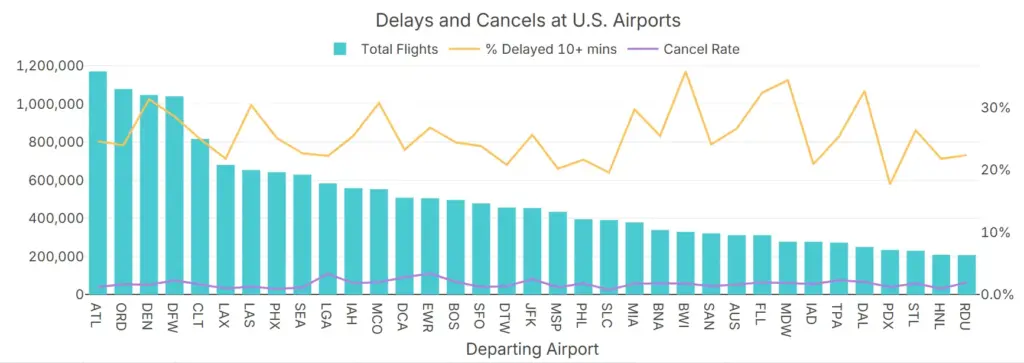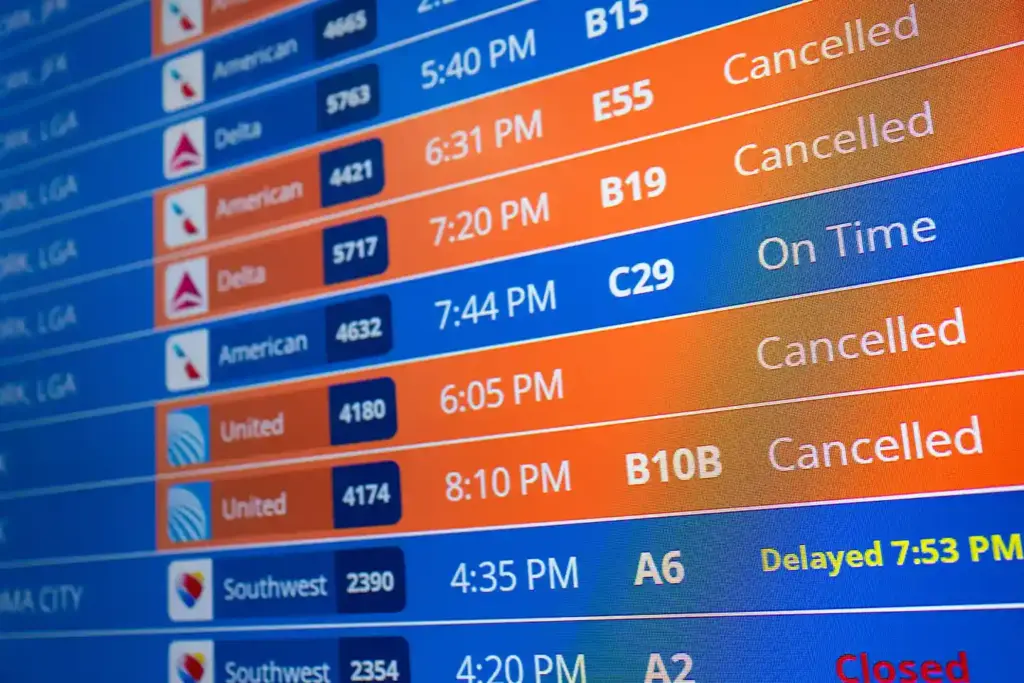As the United States faces the prospect of a government shutdown, flight cancellations are surging, with over 8,000 flights grounded in the first week. The Federal Aviation Administration (FAA) has imposed flight reduction quotas due to air traffic controller staffing shortages, leading to growing chaos in the air travel industry.

If the shutdown continues, air travel could face widespread disruptions, affecting millions of travelers and impacting the economy.
Flight Cancellations Surge as Shutdown Threat
| Key Fact | Detail/Statistic |
|---|---|
| Total Flight Cancellations | Over 8,000 flights cancelled in the first week of the shutdown |
| FAA’s Restrictions | FAA imposed 4% reduction in flights; up to 10% more if shutdown continues |
| Economic Impact | Daily losses of up to $10 million per airline due to disruptions |
| Air Traffic Controller Absenteeism | Thousands of controllers are working unpaid; absenteeism rates are rising |
Flight Cancellations Surge as Shutdown Threat Grows
The U.S. aviation industry is facing a severe crisis as flight cancellations continue to surge amid the looming government shutdown. As more than 8,000 flights have already been cancelled, the Federal Aviation Administration (FAA) has warned that these disruptions will continue unless the shutdown is resolved.
The situation is exacerbated by staffing shortages among air traffic controllers, many of whom are working without pay, leading to increasing absenteeism and operational inefficiencies.

What’s Causing the Disruptions?
The primary cause of the disruptions is a shortage of air traffic controllers, which has forced the FAA to implement flight reduction quotas at key airports. These cuts, which have already reached 4%, could escalate to 10% if the shutdown persists.
The FAA’s decision to limit air traffic is aimed at maintaining safety standards despite the reduced staffing levels. This reduction in capacity has led to a snowball effect, with major airlines canceling flights and thousands of passengers stranded at airports nationwide.
Aviation experts caution that if the shutdown drags on, the situation could deteriorate further, with more flights being grounded and the potential for chaos at airports during the busy holiday season.
The Impact on Travelers and the Airline Industry
Passengers: Stuck in Limbo
Passengers are the first to feel the effects of the shutdown. With thousands of cancellations and many more delays expected, travelers face uncertainty as airlines scramble to rebook flights. The issue is compounded by limited availability of alternative flights, and long wait times at airports due to reduced staff and congested terminals.
“The holiday season is already one of the busiest times of year for air travel, and with the shutdown, people are now facing unpredictable delays and cancellations,” said Laura Martinez, a spokesperson for the U.S. Travel Association. Many travelers are being left without answers as airlines work to accommodate the backlog.
Airlines Struggling to Cope
Airlines are struggling with the logistical and financial fallout of the shutdown. With over 8,000 flights cancelled so far, airlines are not only facing losses of up to $10 million a day but also the logistical nightmare of trying to rebook passengers. Budget carriers, which operate on thin margins and have fewer resources to manage such a crisis, are especially vulnerable.
Moreover, the loss of revenue comes at a crucial time for the industry, as holiday travel represents a significant portion of annual earnings.
“We are seeing ripple effects throughout the travel ecosystem,” said John Williams, an analyst at Global Aviation Insights. “Airlines, airports, and businesses related to tourism are all suffering because of this ongoing crisis.”
The Broader Economic Impact
Freight and Cargo Disruptions
While the crisis has primarily affected passenger flights, the disruption is also impacting air cargo operations. Airlines that typically carry freight are now facing major delays, which could affect industries that rely on timely delivery of goods, including e-commerce and manufacturing.
With major hubs like Los Angeles International Airport (LAX) and Chicago O’Hare operating at reduced capacity, air cargo shipments are seeing delays, and costs are rising for businesses that rely on rapid transportation of goods. Experts warn that if the shutdown continues, this could lead to disruptions in global supply chains, further straining the economy.
Impact on the Tourism Industry
The tourism sector is particularly vulnerable to flight disruptions, as many people make last-minute travel plans during the holiday season. Hotels, restaurants, and local attractions in major cities rely heavily on tourism dollars. As air travel becomes increasingly unpredictable, the knock-on effects on these businesses will be significant, with some areas seeing a decline in revenue due to canceled trips and delayed arrivals.
What Are Government Officials Doing to Address the Situation?
As of now, the government has not taken significant steps to resolve the shutdown, and the impact on air travel continues to worsen. The Biden administration has been in discussions with lawmakers, but until the issue is addressed, the aviation sector will likely remain in turmoil.
In the meantime, the FAA is doing its best to manage the situation, but with so many employees working unpaid, there are growing concerns about safety and the long-term viability of this strategy.
What Travelers Can Do to Prepare
Stay Informed and Flexible
Travelers are advised to stay informed by regularly checking flight statuses and airport conditions. Many airlines are offering free rebooking options, but availability is limited, especially for international flights. It’s essential to monitor your airline’s website or mobile app for updates.
Consider Travel Insurance
Given the unpredictable nature of the current situation, travel insurance is strongly recommended. Many policies offer coverage for flight cancellations and delays, which could save you money in case your plans are disrupted.
Plan for Longer Wait Times
Airports across the country are reporting longer wait times for check-in, security, and customer service due to staff shortages. Travelers should arrive at the airport well in advance and be prepared for delays during check-in.

Related Links
Veterans Day Surprise — Dunkin’ Rolls Out a Free Treat for Those Who Served
What’s Next?
If the shutdown continues, the disruptions to air travel are likely to worsen. The FAA has already announced that it may further cut flights if the situation doesn’t improve, and the ripple effect could be felt for weeks, especially during the holiday rush. Airlines will continue to face financial strain, while airports and travelers will remain in a state of uncertainty.
A Long Road to Recovery
As the U.S. faces the ongoing threat of a government shutdown, the aviation industry is bracing for even more disruptions. With thousands of flights cancelled, the impact on both passengers and the economy is becoming increasingly severe. Travelers should remain flexible, keep a close eye on flight updates, and prepare for possible delays as the crisis unfolds.
The U.S. aviation sector faces a long road to recovery, and the public is left wondering when this stalemate will end and how it will reshape the future of air travel.





